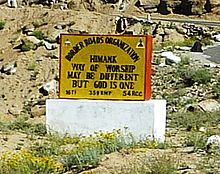
Back حوار الأديان Arabic আন্তঃধর্মীয় সংলাপ Bengali/Bangla Diàleg interreligiós Catalan Mezináboženský dialog Czech Interreligiöser Dialog German Interreligia dialogo EO Diálogo interreligioso Spanish گفتگوی بین ادیان FA Uskontodialogi Finnish Dialogue interreligieux French




Interfaith dialogue, also known as interreligious dialogue, refers to cooperative, constructive, and positive interaction between people of different religious traditions (i.e. "faiths") and/or spiritual or humanistic beliefs, at both the individual and institutional levels.
Throughout the world there are local, regional, national and international interfaith initiatives; many are formally or informally linked and constitute larger networks or federations. The often quoted statement "There will be no peace among the nations without peace among the religions. There will be no peace among the religions without dialogue among the religions" was formulated by Hans Küng, a Professor of Ecumenical Theology and President of the Global Ethic Foundation.[2] Interfaith dialogue forms a major role in the study of religion and peacebuilding.
- ^ "Deklarasi Bersama Istiqlal dengan tokoh lintas agama di Terowongan Silatuhrami, Jakarta". infopublik.com (in Indonesian). 5 September 2024. Retrieved 5 October 2024.
- ^ Musser, D & Sunderland, D., War or Words: Interreligious Dialogue as an Instrument of Peace Cleveland: The Pilgrim Press, (2005) 1.